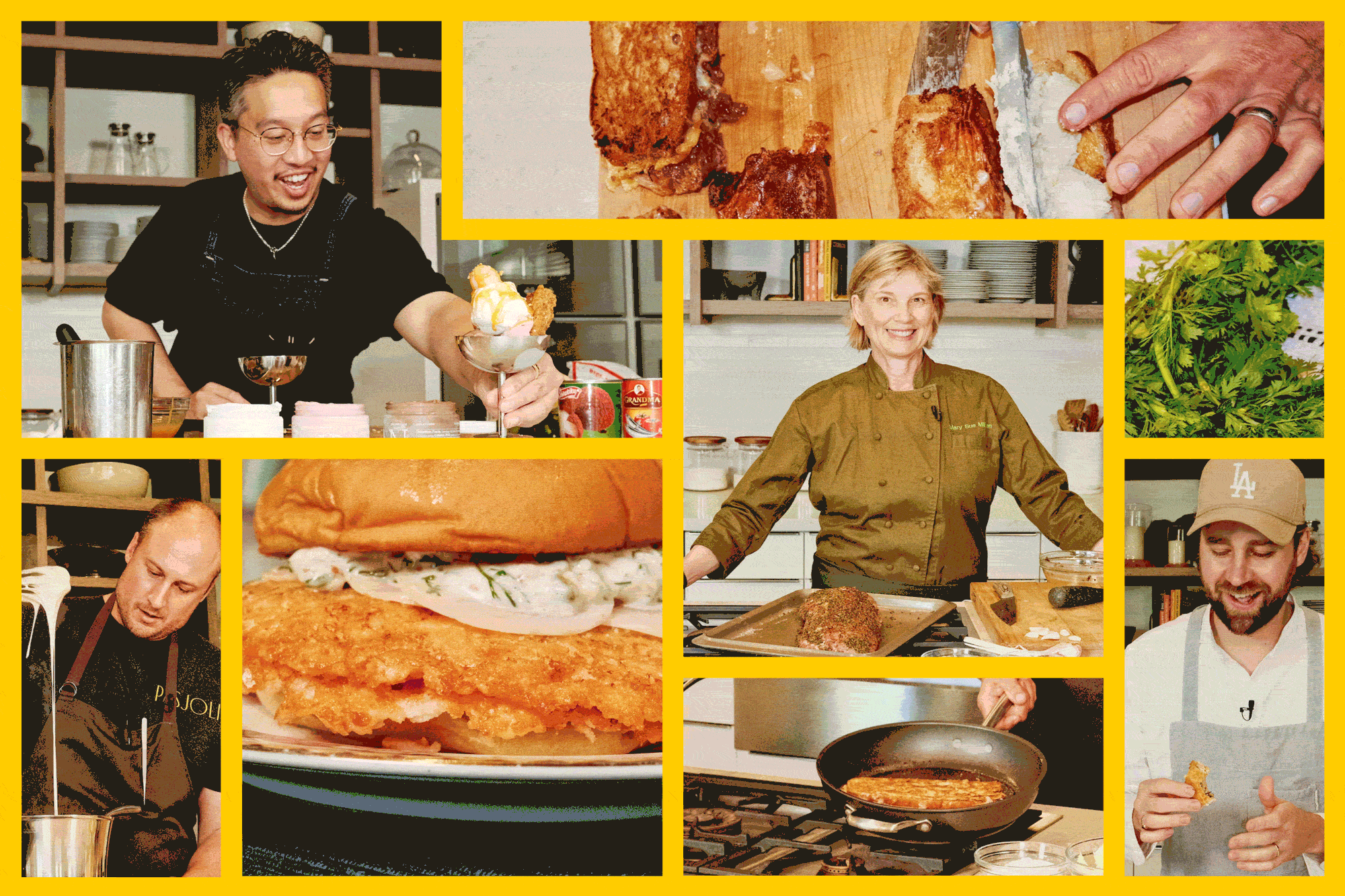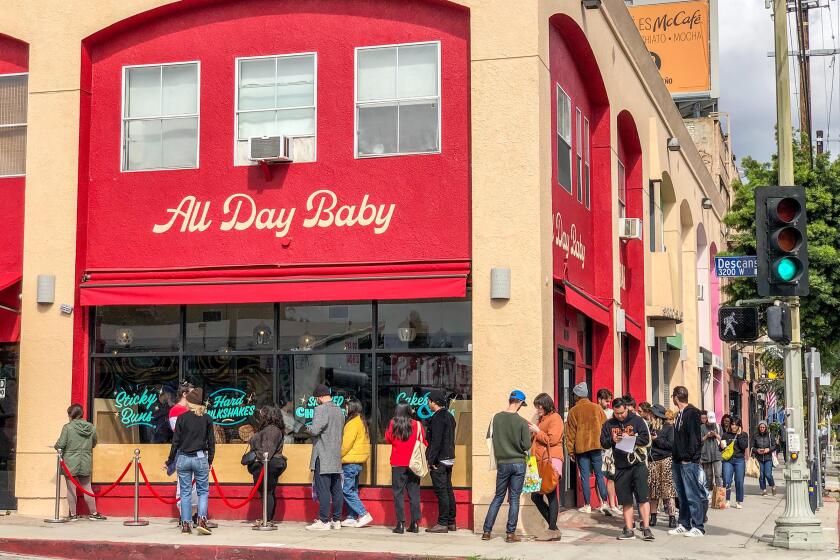Chef memoirs: What hath Anthony Bourdain wrought?
Anthony Bourdain didn’t invent the chef memoir, but he revolutionized it. And judging by the latest crop of books, I’d say he has a lot to answer for.
In the old days, chef stories followed a pretty staid outline: childhood in sunny France, first job, first great chef, own restaurant, and after many struggles, stardom. Like Horatio Alger stories they were at once almost ritualistic in their progress and thoroughly sanitized, yet oddly comforting in their predictability.
Bourdain changed all that with his “Kitchen Confidential.”
The story of a wayward chef and his exceedingly merry ways, “Kitchen Confidential” turned food publishing on its head. Not only did it bear little or no resemblance to its chef-ography predecessors, it joyously trampled on their pieties. It was full of sex and drugs, and it described a cooking career that could most charitably be described as underachieving.
Restaurant kitchens, it turned out, were hotbeds of bad behavior, more akin to high school locker rooms than the artist’s ateliers we’d been led to believe they resembled. And “Kitchen Confidential” cheerfully laid it all out with an attitude that was like a food version of “Seinfeld”: “No hugging, no learning.”
And like the television show, it was both utterly enjoyable and outrageously successful. Professionals and amateurs alike thrilled to the inside story of what life in a professional kitchen is really like. Published in 2000, “Kitchen Confidential” has sold well over 1 million copies.
Certainly part of the reason the book did so well was because it was the first of its kind. But more important, Bourdain is a born storyteller (he’d published two novels before hitting the nonfiction trail). Nobody since George Orwell delivered such an honest and unflinching look at the behind-the-scenes world of the professional kitchen.
This created not a little bit of angst in the restaurant world.
A friend who is a World Famous Chef called me right after the book came out concerned with the way his profession had been portrayed. Relax, I told him, it’s better people know about all the hard work and sweat that goes into great cooking rather than just assuming it happens by magic.
But after having waded through four chef memoirs that have been published just in the last couple of months, I have to admit I’m regretting those words. Call them Bourdain’s bastard children. And while each of these books has its moments, they really only point up how remarkable their sire actually was.
‘Spiced’
The best of the lot is Dalia Jurgensen’s “Spiced.” A top New York pastry chef, Jurgensen delivers the best sense of both the inspiration and perspiration of professional cooking. And you can tell from the way she talks about food that she’s deeply connected to it -- something that’s not as common as you might expect in these books.
The book has gotten a lot of buzz because of Jurgensen’s uninhibited approach to the telling of matters of love and sex (a little girl-on-girl experimentation, a long-running affair with her boss . . . really not that big a deal in these post-Bourdain days).
But I found her oddly reticent about what matters most -- her food.
Her desserts sound amazing, inventive but not silly. But Jurgensen rarely takes the time to explore why she does what she does in the kitchen. The sole exception, which comes near the end, is quite a tease; her explanation of how she balances flavors and textures in a bamboo-honey panna cotta is fascinating.
Inspired by a dark, slightly bitter honey she found at the farmers market, she used it to flavor a panna cotta. The result was a little sweet, so she accompanied it with a raspberry sauce that she deliberately under-sweetened. For crunch and more depth of flavor, she garnished the dish with sliced almonds that she’d dusted with bee pollen, “a bright yellow dust with a floral earthiness.”
‘Cooking Dirty’
On the other hand, a little more reticence is exactly what I was praying for while reading Jason Sheehan’s “Cooking Dirty” (to be published this month). Sheehan pictures himself as a poster boy for kitchen bad behavior and details years of careening from self-inflicted meltdown to self-inflicted meltdown with an almost operatic tone.
The problem is, he’s just not that interesting. And he’s not that great a cook. I had to keep reminding myself that for most of the book he’s really just a guy working in a diner. He affects a Keith Richards swagger, but culinarily he’s a drummer in a garage band.
In the end, sickened by all of his wasted opportunities (and his blowhard approach to bragging about them) I just wanted the book to be over.
And while we’re at it: Although wartime metaphors have been part of kitchen stories since the beginning, there ought to be a moratorium on them while people are actually fighting and dying. Let’s get this straight: Professional cooking is hard, pressured and sometimes slightly dangerous, but let’s not mistake cut fingers and scorched forearms for what happens in battle.
‘The Hunger’
In an odd way, John Delucie’s “The Hunger” is perhaps the most accurate description of the careers of many chefs these days. Delucie was a journeyman until the gods of fortune smiled upon him with a business partner named Graydon Carter, whose Vanity Fair Rolodex ensured a packed and illustrious dining room from Day 1 at their restaurant Waverly Inn.
Delucie is the kind of cook who takes pride mostly in his professionalism. He’s a demon on food cost and efficiency. But when he talks about what he’s cooking, there’s little sense of passion. It seems he’s mostly putting spins on dishes he knows will sell well from places he’s worked before.
Probably the most revealing moment in the book is when, feeling full of success, he goes to a big foodie chef event in Miami thinking he’s a star and realizes he’s just climbed the bottom rung of yet another ladder.
‘Under the Table’
On the other hand, Katherine Darling’s “Under the Table,” the story of her time as a student at New York’s French Culinary Institute, is so ripe with folly it’s probably best read as a Bridget Jones-like parody. Tired of her unglamorous life in publishing, Darling decides to go to cooking school with the intention of becoming the next Rachael Ray.
There are several problems. First, she is an utter snob of the shallowest sort; she seems to pay more attention to what her fellow students are wearing than to the cooking lessons (and her horror at having to wear school-issued front-pleated chefs pants is only alleviated by a trip to the tailor). She has little stomach for handling food (like crying in baseball, there should be no “ewwwwws” in a professional kitchen). Worst of all, Darling doesn’t write very well. She apparently never met a cliché she didn’t fall in love with (dishes are repeatedly described as “mouth-wateringly delicious”). But what’s really delicious is the inadvertent hilarity. At one point she confuses fraisage (rubbing pie dough to get a flaky crust) with frottage (rubbing of an entirely different sort).
But I have to admit, I got my biggest smile of all picturing her working in Anthony Bourdain’s kitchen.
More to Read
Eat your way across L.A.
Get our weekly Tasting Notes newsletter for reviews, news and more.
You may occasionally receive promotional content from the Los Angeles Times.










